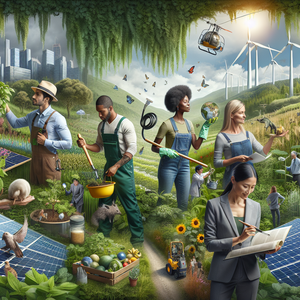
15 In-Demand Careers in Sustainability: Shape a Greener Future
As the world grapples with pressing environmental issues, the field of sustainability has gained unprecedented importance. Organizations across various sectors are prioritizing eco-friendly practices, leading to a surge in demand for sustainability professionals. From environmental scientists and sustainability managers to urban planners and renewable energy analysts, numerous roles are available that cater to diverse skill sets and interests. Each position is crucial in driving sustainable practices, improving resource efficiency, and mitigating climate change. For instance, sustainability specialists collaborate with businesses to lessen their ecological footprint, while urban planners design communities that embrace sustainability. This article explores 15 impactful careers in sustainability, detailing their contributions to a healthier planet, job demand, salary expectations, and how to start your journey in this fulfilling field.
Job Summaries:
Environmental Scientist:
- Environmental scientists conduct research to address critical environmental challenges.
- Their work involves field studies and scientific analyses to assess pollutants and manage natural resources.
- Generally requiring a bachelor’s degree in environmental science or a related field, this role is essential for developing policies that protect ecosystems and promote sustainability.
Sustainability Manager:
- Sustainability managers guide organizations in implementing and enhancing sustainability initiatives.
- They ensure compliance with environmental regulations.
- They devise strategies to reduce waste and improve energy efficiency.
- A background in business or environmental science is often necessary.
- Strong project management skills are often necessary.
- This role is pivotal in cultivating a culture of sustainability within companies.
Urban Planner:
- Urban planners design land-use strategies that balance community needs with environmental considerations.
- By analyzing data and engaging with the public, they work alongside government officials to promote sustainable urban growth.
- Typically requiring a master’s degree in urban planning, urban planners play a vital role in creating resilient cities with green spaces and efficient transportation systems.
Environmental Engineer:
- Environmental engineers utilize engineering principles to enhance environmental quality.
- They design systems for water treatment, waste management, and pollution control.
- A degree in environmental or civil engineering is crucial, along with relevant certifications.
- Their expertise is key in developing sustainable infrastructure that meets environmental standards.
Sustainability Consultant:
- Sustainability consultants help organizations refine their sustainability practices.
- They conduct assessments, develop strategies, and provide recommendations to mitigate environmental impacts.
- A background in environmental science or business is advantageous, along with strong analytical and communication skills.
- This role is instrumental in aiding companies to reach their sustainability goals while enhancing operational efficiency.
Renewable Energy Analyst:
- Renewable energy analysts assess the viability and impacts of renewable energy projects.
- They analyze market trends and technologies to inform energy policy decisions.
- A degree in renewable energy, environmental science, or engineering is usually required.
- Their work is vital in supporting the transition to sustainable energy solutions.
Corporate Social Responsibility (CSR) Manager:
- CSR managers develop and oversee initiatives that promote corporate social responsibility.
- Emphasizes environmental sustainability and social equity.
- Engage with stakeholders and report on sustainability performance.
- A degree in business, sustainability, or social sciences is often needed.
- Strong interpersonal skills are required.
- This role enhances a company's reputation and commitment to sustainable practices.
Ecologist:
- Ecologists study ecosystems and the relationships between organisms and their environments.
- They conduct field research and develop conservation strategies.
- A degree in ecology, biology, or environmental science is required.
- Analytical skills are necessary for ecologists.
- Their work is essential for understanding biodiversity.
- Their work informs conservation efforts.
Sustainability Director:
- Sustainability directors lead an organization's sustainability strategy.
- Ensure alignment with corporate goals and regulatory compliance.
- Manage teams and initiatives aimed at reducing environmental impacts.
- Typically requiring a master’s degree in sustainability or a related field.
- This role is crucial for driving comprehensive sustainability efforts.
Climate Change Analyst:
- Climate change analysts evaluate climate data to assess impacts and develop strategies for mitigation and adaptation.
- Collaborating with various stakeholders, they model future climate scenarios and guide policy decisions.
- A degree in environmental science or climate science is essential.
- Their expertise informs climate action plans and strengthens resilience against climate-related challenges.
Sustainable Agriculture Specialist:
- Sustainable agriculture specialists advocate for eco-friendly farming practices that improve soil health and benefit local communities.
- They provide guidance to farmers on sustainable techniques.
- This role requires a degree in agricultural science or a related field and strong communication skills.
- This role is vital in fostering sustainable food systems and promoting environmental stewardship.
Energy Efficiency Consultant:
- Energy efficiency consultants evaluate and recommend enhancements for energy use in buildings and facilities.
- They conduct audits, analyze energy consumption, and develop strategies for waste reduction.
- A background in engineering or environmental science is beneficial, with certifications in energy management often preferred.
- This role is key for helping organizations lower energy costs and reduce their carbon footprints.
Environmental Health and Safety (EHS) Manager:
- EHS managers create and implement policies to ensure compliance with environmental health and safety regulations.
- They conduct audits, provide training, and monitor environmental performance.
- A degree in environmental science, safety management, or a related field is typically required.
- Their expertise is essential in promoting workplace safety and sustainability.
Wildlife Biologist:
- Wildlife biologists study animal populations and their habitats.
- They conduct field research and collaborate with conservation organizations.
- A degree in biology or wildlife management is necessary.
- Strong analytical skills are required.
- Their work is critical for preserving biodiversity.
- They help protect endangered species.
Environmental Educator:
- Environmental educators create programs to educate the public about environmental issues and sustainable practices.
- They work in schools, non-profits, or community organizations to foster environmental stewardship.
- A degree in education, environmental science, or a related field is often needed, along with strong communication skills.
- This role is essential for nurturing a culture of sustainability and empowering future generations.
These diverse roles highlight the vast opportunities available in sustainability, each contributing significantly to a healthier planet. The sustainability sector is expanding rapidly, offering competitive salaries and high demand for skilled professionals. Those interested in pursuing a career in sustainability should explore current job openings and educational resources that align with their passions and skills, paving the way for a meaningful and impactful career in this essential field. By actively participating in these roles, individuals can help drive the change needed for a sustainable future.
Explore More Jobs

